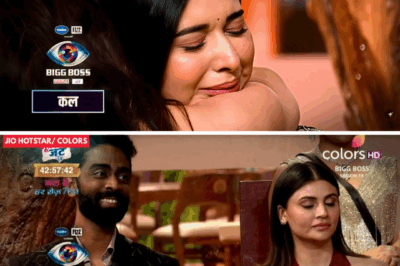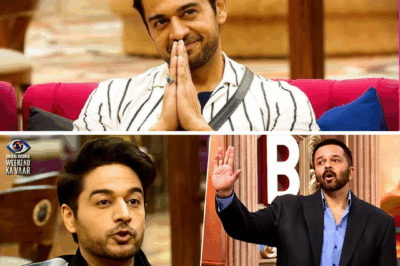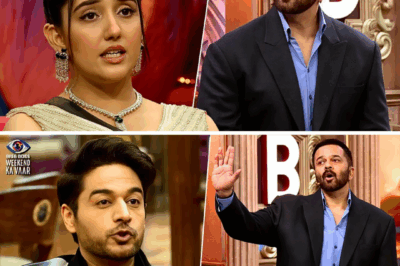The latest episode of Bigg Boss 19 opened with a palpable tension in the house, a simmering unease that seemed to hover over every conversation and glance exchanged between the contestants. What started as subtle disagreements soon erupted into a full-blown confrontation between Amaal and Malti, leaving the entire house and viewers at home on edge. Emotions, raw and unfiltered, spilled over as both participants stood their ground, unwilling to back down, their voices rising in frustration. This was not just another argument; it was a clash of personalities, strategies, and pride that revealed deeper undercurrents of tension within the house.
Amaal, known for his assertive personality and fiery temperament, confronted Malti over a series of perceived slights and misunderstandings that had accumulated over the past weeks. Malti, equally strong-willed and unwilling to cede any ground, responded with her own sharp words and pointed remarks. What could have been a fleeting disagreement transformed into a spectacle of emotions, with both contestants passionately defending their perspectives. The housemates watched in silence at first, some trying to mediate, others observing cautiously, aware that any interference could escalate the situation further.
As the confrontation intensified, Farrhana, often seen as a calm and reasoned presence in the house, stepped forward to mediate. She recognized the growing emotional stakes and the potential for the argument to spiral out of control. With a combination of assertiveness and empathy, Farrhana encouraged both Amaal and Malti to step back and articulate their feelings without resorting to aggression. Her intervention, though subtle, was pivotal. It reminded the house that while conflict is inevitable, dialogue and understanding can prevent temporary disagreements from becoming lasting rifts.
The fight between Amaal and Malti was not just about the surface-level triggers. Viewers quickly noticed that underlying issues had fueled the tension: differences in strategy, contrasting personalities, and unspoken frustrations that had built up over weeks of close-quarters living. Amaal’s direct, sometimes confrontational approach clashed with Malti’s equally determined and unapologetic stance. This collision of styles magnified small grievances into significant points of contention, turning ordinary disagreements into highly charged arguments that captured the attention of everyone in the house.
Farrhana’s role in this episode highlighted the importance of diplomacy and emotional intelligence in the Bigg Boss house. She skillfully navigated the volatile situation, acknowledging the validity of each contestant’s feelings while urging them to find common ground. Her calm presence contrasted sharply with the intensity of the argument, demonstrating that even in an environment designed to provoke drama, reason and empathy can have a powerful influence. Farrhana’s intervention was not about taking sides but about restoring balance and reminding both Amaal and Malti of the broader dynamics of the game.
The reactions of other housemates added further complexity to the scene. Some expressed subtle support for one participant or the other, while a few remained silent, unwilling to get entangled in the confrontation. The tension was palpable, and every movement, glance, and word seemed loaded with potential consequences. For the audience, these moments offered a rare glimpse into the delicate social dynamics of the house, where alliances, strategies, and emotions intersect in unpredictable ways.
Social media buzzed almost immediately following the episode, with fans divided over who was “right” in the confrontation. Some praised Amaal’s forthrightness and unwillingness to tolerate perceived disrespect, while others admired Malti’s assertiveness and refusal to back down. Farrhana’s measured approach, however, became a focal point for discussions online, with many viewers applauding her ability to mediate and maintain composure in a tense situation. The online discourse mirrored the drama inside the house, highlighting the intense interest and emotional investment that fans bring to every twist and turn of Bigg Boss 19.
The episode also revealed the emotional vulnerabilities of the contestants, a recurring theme in Bigg Boss. Living under constant observation, isolated from the outside world, and navigating ever-shifting alliances can heighten sensitivity and magnify even minor disagreements. The Amaal-Malti confrontation was a vivid example of how these pressures can surface in the form of intense arguments, yet it also demonstrated the possibility of conflict resolution through empathy, patience, and honest communication. Farrhana’s role in defusing the tension reminded both contestants and viewers that even in a competitive environment, humanity and understanding remain essential.
For Amaal, the argument represented more than just a clash with Malti—it was a test of his emotional resilience and ability to handle confrontation without letting it derail his focus on the game. For Malti, the fight was a moment to assert her autonomy and defend her position, a demonstration of strength and self-assurance. For Farrhana, it was an opportunity to exercise leadership, compassion, and fairness, showing that even amidst drama, one can act with integrity and care. Together, these dynamics created a compelling narrative that captivated viewers and highlighted the intricate emotional landscape of the Bigg Boss house.
In the aftermath of the confrontation, the house slowly returned to a tentative calm. While tensions remained beneath the surface, Farrhana’s intervention had prevented escalation into a more damaging conflict. Housemates resumed their routines with subtle reminders of the emotional stakes involved in every interaction. Meanwhile, Amaal and Malti were left to process their feelings, reflecting on the consequences of the argument and considering how their actions would impact both personal relationships and game strategies moving forward.
This episode of Bigg Boss 19 serves as a powerful illustration of the emotional complexities inherent in the show. The confrontation between Amaal and Malti, and Farrhana’s timely mediation, highlighted how conflict, empathy, and strategy coexist within the house. It revealed the delicate balance contestants must maintain between personal expression and social awareness, as well as the ways in which human emotions can be both a source of drama and an opportunity for growth.
For viewers, the episode was an emotional rollercoaster, blending suspense, tension, and moments of thoughtful reflection. The argument drew attention not only to the personalities of Amaal and Malti but also to the broader themes of conflict resolution, empathy, and interpersonal dynamics. Farrhana’s role provided a model for constructive intervention, demonstrating that even in high-pressure, emotionally charged situations, calm reasoning can guide the way.
As Bigg Boss 19 continues, the Amaal-Malti confrontation is likely to have lasting effects on alliances, strategies, and the house’s social dynamics. Fans will continue to debate, analyze, and predict the implications, while contestants navigate the delicate balance between competition and camaraderie. This episode stands as a reminder that in the Bigg Boss house, every interaction carries weight, every argument reveals character, and every act of empathy or mediation can leave an indelible mark on the unfolding story.
After the heated confrontation, the atmosphere in the Bigg Boss 19 house remained charged, as though the tension from Amaal and Malti’s fight had left an invisible mark on every corner. While the immediate argument had been diffused by Farrhana’s intervention, the emotional residue lingered. Amaal, pacing in the living area, seemed torn between frustration and reflection. His usual assertiveness was tempered now by the realization that in the confines of the house, every word, every action, carries consequences far beyond the moment. The confrontation had revealed vulnerabilities he rarely allowed to surface, and for the first time, he began to contemplate the impact of his temperament on alliances and personal relationships within the house.
For Malti, the confrontation was equally complex. She had entered the argument determined to assert herself, unwilling to be sidelined or misunderstood. Yet, after the storm, there was a sense of introspection. Alone in the quiet of her room, she replayed the words exchanged, examining both her own reactions and Amaal’s responses. The fight had been a catalyst, exposing frustrations and miscommunications that had accumulated over weeks of living in close quarters. It forced her to consider not just the immediate emotional satisfaction of standing her ground but also the longer-term implications for her standing in the house and the perception of other contestants.
The other housemates, meanwhile, were navigating their own responses to the confrontation. Some remained observant, cautious not to intervene unnecessarily, while others began to discuss the incident in hushed tones, analyzing alliances and predicting how the argument might influence future interactions. The tension had revealed fault lines in relationships, but it had also highlighted unexpected dimensions of character. Farrhana’s role as mediator became a point of reflection for many—her calm and reasoned approach contrasted sharply with the volatility displayed by Amaal and Malti, earning her a new level of respect in the eyes of both the contestants and viewers at home.
This incident also shed light on the psychological pressures of the Bigg Boss house. The combination of constant surveillance, forced proximity, and high-stakes competition can amplify emotions to a level rarely seen outside such an environment. Amaal and Malti’s fight was, in many ways, an inevitable eruption of these pressures. What made it compelling, however, was the clarity it provided into the human dimension of the contestants: their fears, their pride, and their need for recognition and fairness. For viewers, this was a rare glimpse of authenticity, a reminder that beneath the glamour and drama lies a very real struggle to maintain composure while navigating interpersonal complexities.
Farrhana’s intervention, though critical, also presented its own strategic dimension. By stepping in, she not only prevented escalation but subtly positioned herself as a voice of reason and a potential ally for multiple housemates. Her actions highlighted a recurring theme in Bigg Boss: moments of conflict are rarely isolated. Every decision, every gesture, reverberates throughout the house, influencing alliances, loyalties, and the broader game strategy. For both Amaal and Malti, this realization added an extra layer of complexity to their reflection—acknowledging the emotional truth of their disagreement while considering the strategic consequences.
The fight also had an immediate impact on house dynamics. Subtle shifts were noticeable in how other contestants interacted with both Amaal and Malti. Some became more cautious, mindful of triggering further conflict. Others saw the opportunity to strengthen their own positions, leveraging the aftermath to realign alliances or test loyalties. In Bigg Boss, a single argument can ripple through the entire social structure, altering perceptions and recalibrating relationships in ways that are sometimes unpredictable but always consequential.
From an emotional standpoint, Amaal’s internal struggle was particularly compelling. Known for his confidence and assertive demeanor, he was forced to confront the vulnerability that arises when emotions overwhelm strategy. The fight exposed not only frustration and pride but also a deep desire for understanding and respect—a need to be seen and acknowledged, even in a competitive environment. Malti, on her part, grappled with similar emotions: the tension between asserting independence and maintaining harmony, the desire to be understood without being judged, and the challenge of balancing emotion with strategy. Both contestants were navigating a delicate balance, caught between personal integrity and the social intricacies of the house.
Social media and audience reactions further amplified the intensity of the situation. Fans analyzed every comment, gesture, and facial expression, offering their own interpretations and judgments. Debates erupted online over who was justified, who overreacted, and who handled the situation most maturely. Farrhana, praised for her intervention, became a focal point for discussion, with viewers highlighting her ability to defuse tension while maintaining neutrality. This public scrutiny added an extra layer of pressure, reinforcing the idea that every emotional response in Bigg Boss is magnified, interpreted, and debated far beyond the walls of the house.
Strategically, the incident could have long-term implications. For Amaal, the fight might serve as a lesson in tempering aggression with diplomacy, recognizing the power of perception and the influence of allies. For Malti, the confrontation could reinforce her reputation as a strong, assertive contestant while also highlighting the need for measured responses in critical moments. Farrhana, by demonstrating leadership and emotional intelligence, subtly reinforced her credibility, potentially shifting the balance of influence in her favor. The incident underscores the interplay between personal emotion and strategic positioning, a hallmark of Bigg Boss gameplay.
As the house returned to its routines, the echoes of the confrontation persisted. The argument had left an indelible mark—not only on Amaal and Malti but on the entire house dynamic. Subtle glances, hushed conversations, and quiet moments of reflection revealed that the incident was far from forgotten. It had sparked introspection, recalibration of strategies, and renewed awareness of how quickly emotions can alter relationships. For viewers, it provided a narrative rich in tension, insight, and human drama, reinforcing why Bigg Boss remains a compelling study of social behavior under pressure.
Ultimately, the Amaal-Malti confrontation and Farrhana’s mediation highlight the core tension of Bigg Boss: the collision of personality, strategy, and emotion within a confined, high-pressure environment. It offers viewers a window into the complexity of human relationships, the challenges of conflict resolution, and the nuanced ways in which empathy and leadership can shape outcomes. In a house designed to test patience, resilience, and social acumen, this incident serves as both a cautionary tale and a demonstration of the power of measured intervention.
In the coming episodes, the fallout from this confrontation is likely to influence both game dynamics and interpersonal relationships. The housemates will adjust their strategies, Amaal and Malti will navigate their emotional responses, and Farrhana’s role as mediator may continue to shape alliances. For fans, the excitement lies not only in the drama but in the unfolding narrative of personal growth, strategic maneuvering, and the human struggle to balance emotion and reason under constant scrutiny.
The episode ultimately reminds viewers that Bigg Boss is more than entertainment—it is a microcosm of human behavior, where conflict, empathy, strategy, and emotion intersect in unpredictable and compelling ways. The house, the arguments, and the interventions provide insight into the universal challenges of communication, leadership, and understanding, all magnified by the intensity of the environment. The fight between Amaal and Malti, and Farrhana’s crucial intervention, will be remembered as a defining moment, illustrating the delicate balance between emotion and strategy that makes Bigg Boss 19 a riveting watch.
In the aftermath of the confrontation, the house of Bigg Boss 19 seemed almost transformed. The echoes of raised voices, the charged looks, and the subtle tensions were still palpable, yet beneath the surface, a new layer of introspection had settled among the contestants. Amaal, often defined by his assertiveness and fiery temperament, now found himself navigating the emotional consequences of his actions. Alone in a quiet corner, he reflected not just on the disagreement itself but on what it revealed about his own emotional patterns, his reactions under stress, and his approach to conflict. The fight with Malti had acted as a mirror, showing him both the strength and the vulnerability that coexist within him.
For Malti, the aftermath was equally complex. Her strong-willed personality had clashed with Amaal’s, but the confrontation forced her to consider the power of perspective and timing. In private moments, she questioned whether her words had escalated the situation unnecessarily or if standing her ground had been the right choice. The emotional turbulence revealed to her the delicate balance required in the house: assertiveness must coexist with strategy, and self-expression must be tempered with awareness of broader dynamics. For both Amaal and Malti, the argument became a learning experience, a moment that tested not only patience and self-control but also the capacity for empathy and reflection.
Farrhana, whose intervention had prevented further escalation, emerged from the incident with newfound recognition among her peers. Her ability to mediate with patience and reason highlighted a subtle yet critical form of leadership in the Bigg Boss house. She demonstrated that influence does not always come from loud declarations or confrontational power; sometimes, it is the calm, reasoned voice that commands attention, earns trust, and stabilizes volatile situations. Her role illuminated an important truth: emotional intelligence can be a game-changer in an environment built on competition, pressure, and scrutiny.
The relationships within the house began to shift in the days following the confrontation. Some contestants became more cautious, measuring their words and actions to avoid similar conflicts. Others, intrigued by the dynamics at play, observed how Amaal, Malti, and Farrhana navigated tension, using the incident as insight into strategy and alliances. Even subtle gestures—a shared glance, a quiet conversation, or a gentle word—took on greater significance. The fight, while dramatic, acted as a catalyst for reflection and recalibration, revealing the interconnectedness of emotions, relationships, and strategy within the confined ecosystem of the house.
Social media and fan reactions added another layer to the unfolding narrative. Fans praised Farrhana’s diplomacy, dissected Amaal and Malti’s behavior, and speculated on the long-term implications for alliances and gameplay. Their discussions underscored the universality of the themes revealed in the confrontation: emotional regulation, empathy, and communication. It became clear that the incident resonated beyond entertainment; it sparked conversations about human behavior, conflict resolution, and leadership under pressure, offering lessons that viewers could reflect upon in their own lives.
For Amaal, the emotional journey was far from over. The confrontation had revealed his capacity for intensity and passion, but it also underscored the importance of self-awareness and restraint. As he interacted with other contestants, he began to test new approaches, combining assertiveness with a measured awareness of tone, timing, and impact. His reflections on the argument were not solely about victory or strategy—they were about understanding how to express himself without alienating others, a nuanced lesson that could shape not only his time in the house but also his broader personal growth.
Malti, too, experienced subtle yet profound shifts. Her willingness to stand firm in the argument was balanced by a growing recognition of the benefits of communication and compromise. She observed how others responded, considering how her actions influenced perceptions and relationships. The confrontation had revealed both her strengths and areas for growth, offering an opportunity to cultivate resilience, empathy, and tactical insight. In doing so, Malti transformed what could have been a moment of conflict into a stepping stone for personal and strategic development.
The interplay between emotion and strategy became a defining theme in the days that followed. Housemates learned to navigate conversations more carefully, to anticipate reactions, and to recognize the impact of their words on both relationships and alliances. Farrhana’s role as mediator became a reference point, a model for handling tension with clarity and composure. Her example reinforced the idea that leadership is not merely about asserting dominance; it is about guiding others through conflict with insight, patience, and fairness.
Emotionally, the house witnessed a subtle healing process. The storm of Amaal and Malti’s fight gradually gave way to moments of reflection, understanding, and tentative reconciliation. The contestants began to appreciate the delicate balance of the environment: high-stakes competition exists alongside human connection, strategy is intertwined with empathy, and conflict can serve as a catalyst for growth rather than destruction. These realizations, while subtle, contributed to a more mindful approach to interactions and relationships within the house.
For viewers, the incident offered a powerful narrative about the human side of Bigg Boss. The fight was dramatic, yes, but it was also deeply relatable: it revealed how pride, frustration, and miscommunication can escalate, and how empathy, calm reasoning, and reflection can restore equilibrium. Fans were drawn not just to the spectacle but to the lessons embedded within it—the importance of emotional intelligence, the value of listening, and the power of measured action in moments of tension.
As the episode’s aftermath unfolded, Amaal, Malti, and Farrhana each displayed subtle growth. Amaal’s assertiveness was tempered by reflection, Malti’s resolve was balanced by awareness, and Farrhana’s leadership was recognized and respected. These developments underscored the multidimensional nature of the Bigg Boss house, where personal evolution and strategic maneuvering occur simultaneously, often under intense scrutiny and pressure. The confrontation had been more than a conflict—it was a microcosm of the broader challenges contestants face in balancing self-expression, relationships, and game strategy.
In the broader narrative of Bigg Boss 19, the Amaal-Malti confrontation will likely be remembered as a defining moment. It highlighted the emotional intensity of the house, the potential for conflict to serve as a catalyst for insight, and the crucial role of empathy and leadership in navigating high-pressure social environments. Farrhana’s intervention, in particular, demonstrated that influence and respect can be earned through composure, fairness, and emotional intelligence rather than aggression or dominance.
Ultimately, this episode serves as a reminder that Bigg Boss is as much a test of character as it is a competition. The clash between Amaal and Malti, coupled with Farrhana’s mediation, illustrated the universal human struggle to balance emotion, strategy, and interpersonal dynamics. It offered viewers lessons about patience, communication, and the subtle art of conflict resolution. The house, with its intense scrutiny and confined spaces, magnifies these lessons, making them both dramatic and instructive.
The story of Amaal, Malti, and Farrhana in this episode exemplifies the transformative potential of conflict when handled with care. Confrontation, reflection, and empathetic mediation combine to reveal not only the vulnerabilities of the contestants but also their capacity for growth. In a house designed to provoke tension, the ability to navigate emotion with awareness becomes a powerful tool—not just for survival in the game, but for understanding oneself and others.
By the end of the episode, the Bigg Boss house had settled into a tentative calm. The emotional intensity lingered, but so did a newfound sense of awareness and connection. Amaal and Malti, having faced the consequences of their actions, emerged with subtle insight and growth, while Farrhana’s role as mediator highlighted the enduring value of empathy, reason, and emotional intelligence. Together, these dynamics created a narrative that was not only dramatic and captivating but also deeply instructive, offering lessons about conflict, leadership, and the power of human connection.
News
Bigg Boss 19: Who Got Eliminated This Week? Shocking Exit Revealed
The atmosphere in the Bigg Boss 19 house was charged with tension as elimination week approached. Contestants were on high…
Bigg Boss 19 Drama: Rohit Shetty EXPOSES Gaurav in Explosive Episode 84
Episode 84 of Bigg Boss 19 started with an air of anticipation. The housemates were already on edge after a…
Bigg Boss 19 Drama: Rohit Shetty Strongly Rebukes Ashnoor in Shocking Confrontation
The Bigg Boss 19 house had been simmering with tension for days, and Ashnoor had emerged as a contestant whose…
Bigg Boss 19 Drama: Farrhana’s Explosive Fight with Malti Shocks the House
The Bigg Boss 19 house had been simmering with tension for days. Contestants were navigating a complex web of alliances,…
Bigg Boss 19 Drama Unfolds: Rohit Shetty Calls Out Tanya Mittal
The Bigg Boss 19 house was already a cauldron of emotions, alliances, and hidden strategies, but as the week’s major…
Bigg Boss 19 Drama: Rohit Shetty Slams Amaal On National TV
The Bigg Boss 19 house has always been a crucible for personalities, a place where tempers flare, alliances form, and…
End of content
No more pages to load











